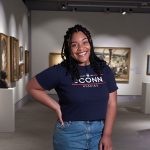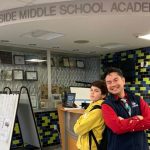White public schools have always gotten more money than Black public schools. These funding disparities go back to the so-called “separate but equal” era – which was enshrined into the nation’s laws by the Supreme Court’s 1896 decision in Plessy v. Ferguson. The disparities have persisted even after Brown v. Board of Education, the landmark 1954 Supreme Court decision that ordered the desegregation of America’s public schools.
Connecticut is the first state in the nation to mandate that all of its high schools offer an elective class on Black and Latinx history. These classes must be taught by the fall of 2022, but many high schools have added them to the curriculum this year. Alan Marcus, a professor of curriculum and instruction in UConn’s Neag School of Education, has led a team that developed a website to assist high school teachers with the instruction of this course.
U.S. Secretary of Education Dr. Miguel Cardona will be visiting Wayne Center Elementary next week as part of tour recognizing teachers and school staff for their efforts in classrooms for the 2021-22 school year. In 2012, Cardona won the 2012 National Distinguished Principal Award for the State of Connecticut and the Outstanding Administrator Award from UConn’s Neag School of Education.
Throughout the academic year, the Neag School is proud to share the latest achievements of its faculty, staff, students, and alumni.
A study co-authored by Neag School doctoral candidate, Robert Cotto, and former faculty member Sarah Woulfin, is featured. A survey of more than 150 parents whose children attend school in Hartford found that child care needs and concerns about the effectiveness of schools’ COVID-19 safety measures strongly impacted whether or not families sent their children back to school buildings for in-person learning in fall 2020.
Josephine “Josie” Jarrett of Benwood is the first recipient of the Judith Bartell Paesani Vocal Music Scholarship at West Liberty University. Judith Bartell Paesani, one of the scholarship’s donors, earned her bachelor’s degree from WLU’s College of Education and went on to earn a master’s from the University of Connecticut.
This latest installment of 10 Questions features Neag School alumni Curtis R. Darragh IV ’15 MA and Kurt Daigle ’19 (CLAS), ’21 MA, who recently won the Connecticut School Counselor Association’s top awards for 2021 for their dedication to school counseling.
A year ago, we were wondering when the vaccine would be available and is it really safe to return to school? Today, those questions are still relevant! This hour, we talk about the mental health needs of students. What sort of support will children need from their schools? Sandra Chafouleas, a Board of Trustees Distinguished Professor of Educational Psychology and co-director of the Collaboratory on School and Child Health at the University of Connecticut, is interviewed.
Devin Kearns, a reading disability researcher who’s been working with the education department on the new universal screening program, said the assessments can take as little as one minute to conduct to identify which skills young readers need extra support with.
The University of Connecticut has named Morgaen L. Donaldson, a renowned scholar of educational leadership and policy, as the next Philip E. Austin Endowed Chair. The Austin Chair was endowed by a group of alumni and supporters to recognize President Emeritus Austin’s many contributions to the University, leading UConn’s transformation into its present status as a top public university in the nation.


